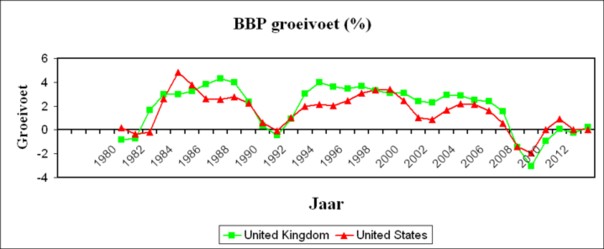
Figure 1a: Growth rate of United States and
United Kingdom
Twenty years ago the social-democratic parties had successes with the policy of the radical centre. The present column analyzes the experiences of the German SPD. The SPD-ideologist Thomas Meyer propagates a social democracy, which defends the positive fundamental rights. Attention is paid to both the view of the social-democratic main current, and the left wing within the SPD (Eppler and Nahles). The OECD data files are used for studying the policy effects of the radical centre.
The Anglo-saxon policy model rather differs from the continental model. Yet during the nineties of the last century both the United States of America (in short USA) and England, as well as Germany and the Netherlands were inspired by the emergence of the radical centre. This new policy has been described in two columns. It is worth studying how the German SPD defines the policy of the radical centre. Here the question is also, to what extent this policy is supported by the SPD members themselves. In Germany the radical centre was realized during the government rule of Rot-Grün, led by chancellor Schröder. It is called the Neue Mitte. Here the policy of the cabinet will not be analyzed, but only the ideological position of the SPD party leaders during that time.
The party certainly does not en bloc support the Neue Mitte. However, the criticism of the own rank-and file on the radical centre is generally not very coherent. Therefore in the remainder of the column it will be largely banned to the footnotes. Nevertheless, it is a fascinating food for thought, at least as much as the main text, and therefore deserves the attention of the reader. The footnotes are indeed quantitatively a significant part of the text and the column.
The German social-democracy does not have an authoritative ideologist of the radical centre, like Giddens in England. In the SPD the radical centre is not a revolution, but an evolution. This approach is personified in among others the ideologist Thomas Meyer. He builds on the core values of freedom, justice and solidarity, which are a free translation of liberté, égalité, et fraternité. Therefore it is useful to consider the social-democratic starting point, the party ideology during the eighties. Characteristic is the view of O. Lafontaine, who in 1990 is the candidate-chancellor of the SPD. Here your columnist consults his book Der andere Fortschritt (in short DaF)1.
Man becomes alienated by the technological progress, and he loses his moral footing (p.33, 98, 109 in DaF)2. In capitalism the workers and nature are exploited (p.159). The progress becomes uncontrollable (p.98). The solution must be found in a growth scepticism (p.14, 42, 106). The economic growth slows down (p.45, 73), and this is actually desirable (p.46, 78). There is jobless growth, which does not contribute to the employment (p.82). Reduction of the working-hours creates new jobs (p.88). Lafontaine sympathizes with workers self-management (p.175-176). He even advocates an unconditional basis income (p.111, 119). The Third World would do wise to protect itself against the unchained globalization (p.135). It benefits from small-scale production (p.143)3.
Lafontaine does not shirk audacious solutions. One-sided disarmament is the best guarantee for peace (p.58). This position is partly a reaction to the electoral rise of the Grünen party. Then Lafontaine even distances himself from his party comrade H. Schmidt, who he calls a technocrat (p.208). Meaning and morals are absent in his approach. Lafontaine promotes a system criticism and a utopia (p.214). Thus in 1989 the SPD passes the Berliner Programm. Nonetheless this utopian program is rejected by the electorat, and your columnist also believes that its view is rather pessimistic. It expresses the then misery in the social-democracy, which was caused by the collapse of its traditional ideology. The triplet freedom, justice and solidarity does remain, which is obviously defendable4.
The ideological reorientation of the SPD occurs mainly thanks to a group around G. Schröder, who becomes the chancellor in the Rot-Grüne coalition government. Now it is interesting to analyze, how the SPD ideologist Thomas Meyer reacts to the course of the radical centre. Meyer is highly in demand as an author, and a representative of the main current. Already before he had contributed to the Berliner Programm. Here your columnist consults his book Die Zukunft der Sozialen Demokratie5 (in short ZsD). Meyer reduces the electoral choice to two types of democracy: libertarian and social. The libertarian variant is applied in the Anglo-Saxon states. The social variant is found on the continent, and Meyer is notably impressed by the Scandinavian form. Here Meyer actually already opposes the radical centre, which originates from Clinton and Blair.
According to Meyer the national and global order is optimal, when the political, economic and social fundamental rights are guaranteed. Thanks to this triplet human dignity is possible, as individual autonomy (p.53, 90 in ZsD). This is the normative basis of the social democracy6. The starting point is tied to the Berliner Programm, because growth and effectiveness are stil not considered as independent values, but are merely instrumental. The legitimacy of the system in the eyes of the people and its stability must not seriously affect the productive performance (p.9 in ZsD). The libertarian democracy guarantees the fundamental rights merely formally (in words). It does not even impose the social rights, although it does believe that they are desirable. According to Meyer the libertarian image of man is egoistic. But the social image of man values bonding, reciprocity and trust (p.33).
However, the people can only use their fundamental rights, when they dispose of sufficient means. The social democracy makes an effort to distribute the required means among the population. In that sense there is a relation with the radical centre, which promotes activation and participation. It is immediately clear, that Meyer focuses on the passive rights, and does not stress the corresponding duties. The so-called positive freedom is quite absolute7. Just like the radical centre, Meyer appreciates a strong and active civil society8. It is true that it can not maintain the fundamental rights by itself, but it does have the means to demand fair legislation from the state (p.19, 47). A sound civil society is a source of stability and integration. The social fundamental rights (education, health care and the like) contribute to the social activities of citizens. They create social capital.
The civil society is the bearer of ethical ideas (morals) (p.55). It is a centre of voluntary activity and of learning processes. Moreover it can defend group interests. An optimal administration requires, that a smart mix of markets, civil society and state is chosen (p.50, 67, 76). Due to the global dynamics, the mix must continuously be adapted. Here Meyer is an institutionalist. Social risks, like unemployment, insufficient education, technological change, globalization, or illness, are a direct threat to the use of the fundamental rights. Therefore the state must take care, that the people are insured against these risks. In principle, the citizens can not avoid these risks alone, or cover them by means of a private initiative. Therefore the individual responsibility is absent (p.30). In other words, everybody must have equal chances in life (p.37, 46).
The political rights guarantee the maintenance of the democracy, and therefore they precede the social ones. Meyer does not state what he means by economic rights. However, he stresses the need of a durable production (p.41 and further), and so he apparently wants to prevent, that the negative externalities of the production are shifted to society (p.82, 124). Meyer is willing to give up some innovative capacity in order to maintain stability )p.71, 116). Wage workers have the right to be sufficiently protected against the markets (p.74, 80). The effectiveness must not undermine the fundamental rights (p.73). The power due to economic concentration must be curbed by means of regulation (p.80). Somewhat traditional is also the idea of Meyer, that the state must organize participation on all levels (p.62 and further). He distrusts commercial media.
According to Meyer the fundamental rights are indispensable to such an extent, that he also wants to guarantee them at the global level. Therefore his ideal of the future is truly a global republic, although he does acknowledge that his desire is utopian (p.140). In this respect he lacks the pragmatism of the radical centre. There must be a global civil society with cosmopolitan ambitions. Even the public media must be global (p.143). The present dynamics of the global trade can threaten the fundamental rights (p.144). Meyer complains,that the European Union has a libertarian structure. He believes that it is possible to have converging national systems within the EU (p.155). There must be a mutual assimilation at the political level. For comparison: Giddens does not reject these proposals of Meyer, but he questions their realizability. Therefore he is satisfied, if unavoidable, with a global confederation (loose league of nations), instead of a republic9. Meyer is not.
All in all, Meyer often prefers a hybrid position, which lies somewhere between the traditional social-democracy and the radical centre. For instance, he believes that a certain flexibility on the labour market is desirable (p.95). The protection against dismissal must leave room for dynamics (p.97). Meyer wants to combine this with child (day) care and the like, in order to further the participation (p.97, 112, 127). Jobs offer access to self-respect and social recognition (p.95, 117). He accepts, that the institutional evolutions of states is path-dependent. This is not a problem, as long as the fundamental rights remain conserved (p.116, 121). All in all Meyer is clearly less critical with regard to the Neue Mitte than is the case for the PvdA-ideologists with regard to Purple. He is willing to see the Neue Mitte as a developing social-democracy. And the social democracy performs at least as good as the libertarian democracy (p.118, 123).
The view of Meyer is not completely satisfactory. First, he does not clearly describe the social rights. Here the social democracy does not need to guarantee results, but merely a maximal effort. This offers little to go by. In his model the state is tempted to maximize the expenditures on the social rights. Your columnist is not convinced, that this is really fair.
Second, Meyer points to the libertarian democracy as the enemy, which must be combatted. Since he equates it to the Anglo-Saxon system, here he clearly opposes the Third way (radical centre) and the New choice of Bill Clinton. America becomes an ideological opponent, and New Labour is in fact expelled from the social-democratic community10. The polarization between libertarian and social implies, that the best institutions of both systems can not be combined and integrated. The path-dependency would prevent the effort to have synergy. Your columnist believes that this is not a fruitful standpoint, and propagates the hypothesis, that the Third Way and the Neue Mitte are strongly related.
It is obvious that many within the SPD are not enthusiastic about the radical centre. This paragraph gives two examples of this, namely the grizzled ideologist and party bigwig Erhard Eppler, and a group of politicians, who are united under the name Die Linke in der SPD. Eppler rose under the lead of Willy Brandt as a national politician. He was in the party board from 1970 until 1991, and has contributed to various programs of principles, including the one of Berlin. He sympathizes with the religious socialism, also in the course of his life. He has published among others Privatisierung der politischen Moral? (in short PM) and Auslaufmodell Staat? (in short AS)11. Eppler indeed propagates christian morals (p.33 in AS). However, he also wants a strong state, which clashes with the christian paradigm of the sovereignty within the personal circle (among others p.72 in PM)12.
Eppler states, that Europeans want a state, which guarantees their existence during sickness or accidents, unemployment, and old age. Therefore he rejects the austerity with regard to state expenditures, as well as the tightening of the access to benefits (p.84 in AS)13. Privatizations hurt the direct democratic control of the concerned services (p.84 in PM, p.97 in AS). It is the public ownership, which stimulates the democratic participation. Thanks to the supply of services the democratic rule becomes legitimate and gains support (p.139 in AS). And low wages for officials would incite to be corrupt. Private media mainly want to get the attention of their public, and therefore favour sensation, which distorts the truth. The image of man among the people becomes commercial (p.157 in AS). Eppler even believes, that private media can increase the outbreak of war (p.146 in AS)14.
Thus Eppler divides the civil society into a good and a bad part. For instance, the churches contribute positively. But other interest groups undermine the general interest (p.79 in PM)15. Eppler, due to his preference for a large state and his distrust of entrepreneurship, is clearly not an adherent of the radical centre. He indeed rejects on p.115 in PM the ideological manifesto, which chancellor Schröder has written together with Blair. Eppler reproaches these leaders, that they are pragmatic and technocrats. They would not promote clear targets and views, and therefore be ideologically empty! They use instrumental rationality instead of value rationality16. Now, the political authority of Eppler obviously belongs to the past. However, the SPD members have become increasingly aged, and therefore such views yet still affect the decisions of the party.
Furthermore, the SPD has a left wing, which presents itself under the name Linke (not to be confused with the party of that name). Andrea Nahles is its most important mouthpiece. She is also known from the Forum Demokratische Linke 21. Here your columnist analyzes her book Mehrheiten mit Links (in short ML)17. In most respects the Linke conform to Meyer and Schröder, but there are also salient differences. The group wants to win the middle class in favour of a left-wing ideology (p.16 in ML). Thus they praise Eppler, who wants to give the primacy to politics and the state (p.22, 213). The state can and must radically regulate the markets (p.213)18. The Linke value social equality (p.218, 220) and cohesion (p.30, 215). Following the traditional socialists, they believe that inequality is an important source of violence (p.219).
The rise of authoritarian (nationalistic) right-wing groups is used as the reason to revive the left ideology (p.11, 207). For, this phenomenon would be caused by the unchained markets (p.13). North-America is held responsible for neoliberalism (p.15, 20, 209). And the liberal globalization is seen as a source of violent conflicts (p.20, 211). According to the Linke, the European Union is the ideal instrument for combatting the global liberalism (p.21, 216, 220). Europe is an avant-garde, thanks to her social model, and she must export this (p.27, 215). In order to realize this goal, ML want to continuously expand the EU at its borders (p.208,213)! Europe could also exert pressure in order to reform global institutions such as the IMF (p.218)19. The Linke clash with the radical centre in their choice for reconstruction instead of liberalism.
More interesting than the internal opposition is the positioning of SPD politicians, who support the Rot-Grüne policies, say the hard core. Here the books Sicherheit im Wandel (in short SW), Die Neue SPD (NS), and Auf der Höhe der Zeit (HZ) will be consulted. The contributions in Die Neue SPD include the concept of a program of principles, which has been edited by Meyer. It is referenced here as NSm20.
On the one hand these titles reflect on the need to reform. The political parties themselves become more pragmatic (p.79, 86 in SW, p.331 in HZ). The middle class is the largest electoral group (p.163 in HZ). Due to this development, the charisma of the party leader becomes more important. Chancellor Schröder is popular, even more than the SPD itself (p.122-124 in SW). On the other hand the term Neue Mitte is hardly used. They prefer to call it the solidary middle or centre (p.341 in NSm)21. Whereas the radical centre prefers independent individuals, who do not avoid risks, the hard core of the SPD emphasizes security and protection22.
Solidarity is propagated as an individual insurance, but even more as positive morals. It is a social capital, which is indispensable for the realization of freedom and equality (p.33 and further in SW). Therefore the state policy must focus on the stimulation of solidarity. Or else the optimal state will not be realized (p.36 and 42 in SW). For the sake of solidarity, the prioritarian egalitarianism is rejected (p.256 in NS). Solidarity actually requires small scales, and therefore decentralization is desirable. The civil society offers good opportunities for this (p.44-46, 180 in SW, p.63 in NS). Moreover, decentralizaton fits well with the ideal of the social cohesion. Bonding and integration are best realized in smaller circles, such as the family, work or the municipality (p.49, 56 in NS, p.309, 312, 319, 335 in NSm). There the personal socialization occurs.
However, the traditional mass movements are in decay (p.73-74, 246 in SW, p.297 in HZ)23. The core somewhat distrusts the private resilience. It believes that state interventions are necessary for the survival of a widespread civil society (p.261 in HZ). The state must give positive incentives to corporate life (p.298-299 in HZ, p.91, 260 in NS, p.318 in NSm)24. Besides, the core admits reluctantly, that a long-lasting support creates dependency, and is actually paternalistic (p.38-40 in SW, p.249 in NS)25. It fits poorly with the increasing individualization and pluralism (p.168 in SW). Therefore it is hoped that various social networks can react in a flexible manner (p.136 in SW, p.267 in NS). The principle of equality is applied to the opportunities in life (especially Die Neue SPD stresses this). It is accepted, that this is accompanied by the obligation to make an effort, and to accept risks.
The SPD wants to realize the principle of equal opportunities mainly in the economy. A continued growth of participation on the labour market is desirable (p.206 in SW). According to the SPD core, activation is an important instrument for curbing the costs of the social security (p.172 and further in SW, p.41 in HZ, p.321 in NSm). Moreover, it stimulates the personal autonomy and meaning. For this reason, unemployment is an injustice. Benefits must be principally temporary, and flexibility becomes a virtue26. The Harz IV laws fit well with this new policy (p.104, 146 in HZ), although their introduction led to social protests. The SPD core unanimously believes, that education is indispensable for the knowledge economy. Besides, well educated people have better chances of finding a job. This implies not only the knowledge of facts, but also learned skills to utilize opportunities (p.321 in NSm).
Already now, in the year 2004, the SPD core identifies the 21-th century with education and knowledge (p.328 in NSm)! Thus education becomes a wonderful remedy27. Therefore large expenditures for education are demanded (p.145 in SW). There is discontent about the poor upward social mobility of new generations in Germany (p.64, 68, 78 and further, 89 in HZ, p.302, 330 in NSm). Education is seen as an instrument against social exclusion (p.224 in SW, p.78 in HZ). A culture of learning and performing is desirable (p.234 in SW). Child (day) care by schools may help (p.65, 90, 97 in HZ). Besides, the education must remind its pupils of their fundamental rights (p.229 in SW, p.91 in NS)28. There is satisfaction about the expenditures in health care. In the future this branch will create extra employment (p.215 in SW). Some do complain about its quality (p.181 and further in SW).
The SPD core is still trying to find an economic policy model. The enthusiasm of the radical centre for free markets is not shared. Gradually these politicians do distance themselves from Keynesianism, and develop a preference for more balanced state budgets (p.141 and further in SW). There is a plea for a mix of supply- and demand-side policy (p.260 in SW), and for a higher productivity (p.211 in SW). Many are unwilling to completely abandon the stimulating conjuncture policies (p.240 in NS, p.326 in NSm)29. On the other hand they realize, that the state debt is a negative heritage for later generations (p.205 in SW, p.157 in HZ, p.16 in NS). There is even a plea for a legal brake on debt formation (p.154 in HZ)30. The SPD accepts the present-day financial markets, but does want more international regulation (p.178 in HZ, p.124 in NS).
The democratic inclination is the essence of the SPD. The core even sympathizes with instruments of direct democracy (p.248, 293 in HZ, p.113 in NS). The German trade union federation DGB is keen on preserving her co-management in the industries (p.152 in SW). It furthers harmony. Of old, the SPD has supported the unions in this respect (p.127 in HZ), and the SPD still has a strong union-related wing. Co-management is realized in the works councils, but also in collective bargaining (called Tarifvertrag in the German language) (p.326 in NSm).
Despite bad experiences the SPD still believes in the reconstruction of society (p.254 in SW, p.20 in HZ). But the notion gains on them, that the state can not in isolation realize reforms (p.268 in SW)31. Many want to focus the social-democracy on consensus (p.259 in SW, p.50 in HZ). For this reason Rot-Grün has furthered the Bündnis der Arbeit (activation!). The corporatism is hailed, as long as it works. The aim is an optimal policy mix. Unfortunately the Bündnis got into a stalemate position (p.257, 265 in NS). Therefore F.W. Steinmeier wants to restrict the duration of the consensus, so that corporatism does not become rigid32. Others in the core now promote the willingness to compromize, instead of consensus. The idea of the universal truth and the general interest is questioned (see p.53 in SW, p.254 in NS). The group interests become leading, and consequently the groups must inform each other well33.
Many contributions in the three books discuss the position of Germany in the world. Your columnist will not elaborate on them, because the hard SPD-core wants a similar international policy as Meyer does. The European Unions is seen as an instrument for economic cooperation (p.190 in HZ). Also here the SPD prefers harmony. Some do propagate an integration at different "speeds" (p.118 in NS). A continuing expansion seems natural, beginning with Turkey (p.193 in HZ)34. The criterion for entry is mainly the acceptance of the European values (p.317 in NSm).
Even in these books, which have been published by the SPD herself, the diversity of opinions is striking. This is logical for a popular party. The loyal core has a pragmatic attitude, and therefore could accept the reformer Gerhard Schröder as their party leader. In spite of this pragmatism the SPD remains somewhat distrusting with regard to entrepreneurship. Yet the core has understood, that individuals are better helped by means of activation than by dependency on benefits. It is interesting, that even after the cabinets Rot-Grün the Neue Mitte in the SPD has succeeded in maintaining and consolidating its position in the party elite (Steinmeier, Steinbrück). The opposition within the SPD against the Neue Mitte has partly left the party, and joined Lafontaine and the new party Die Linke. This all makes the German social-democracy more stable than her European sister-parties elsehwere (PvdA, Labour, Parti Socialiste)35.
The present paragraph presents a number of empirical data, with the aim to study the policy effects of the radical centre. Your columnist warns in advance, that this part of the column is rather meaningless. First, it requires specialist skills to collect sound empirical data. The present paragraph consults the available data files of the OECD. It is hoped that the reader appreciates, that no attempt is made to check or evaluate the quality of these files. It must be acknowledged that such an evaluation is actually necessary for a profound interpretation of the data. Second, the international comparison of economic variables is quite complex, because the national institutions are always different. Strictly speaking, these institutions must also be studied - which your columnist omits.
Despite these imperfections it is ultimately unavoidable to compare the theoretical arguments with the daily reality. For, otherwise the argument remains purely academic, and of little practical relevance. Therefore, here yet the argument is tested against the data, albeit merely globally. Your columnist hopes in the future to perfect the quality of the empirical tests, just like in the past years the theoretical arguments in the Gazette have gained in depth. Data are presented for the USA, the United Kingdom (UK), Germany (GE / DL), the Netherlands (NL), France (FR) and Belgium (BE).
The US and the UK are classified as Anglosaxon or liberal states, whereas the remainder is called continental or christian-democratic36. In the first mentioned four states the radical centre has ruled for a period, whereas FR and BE have continued a traditional policy. This paragraph wants to analyze the policy effects by means of international comparisons, and for this purpose distinguishes between three clusters of related states: (US, UK), (GE, NL), and (FR, BE). The analysis is based on time series (1980-2013), because policy usually aims at the mid-term. In time series the global economic conjuncture must be taken into account. Therefore, first the real economic growth rate (corrected for inflation) is studied.

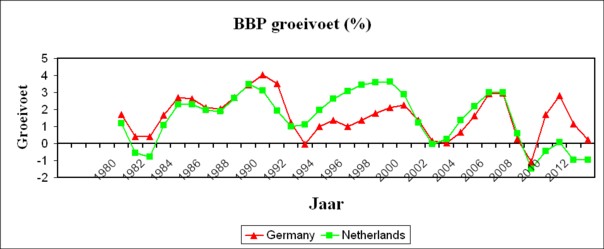
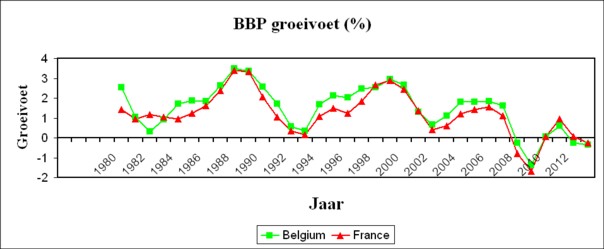
The yearly growth rate of the Gross domestic product (GDP) is shown in the figures 1a-b-c for the three mentioned clusters. Your columnist has slightly flattened the data from the OECD file with a three-point moving average. Nevertheless, in all three time series baisses can be observed around 1983, 1993, 2003, and 2010. These are periods of rising unemployment, despite the national policy. The weak German recovery in the period 1993-2000 is striking. This can partly be explained by the German unification in 1991. The rapid German recovery after 2010 is also striking. In GE this recovery is indeed attributed to the reforms, realized by the radical centre. The mildness of the baisse of 2003 in the UK is also surprising. Nevertheless, the comparison of the figures 1a-b with the figure 1c does not show a convincing improvement as a result of the rule of the radical centre.
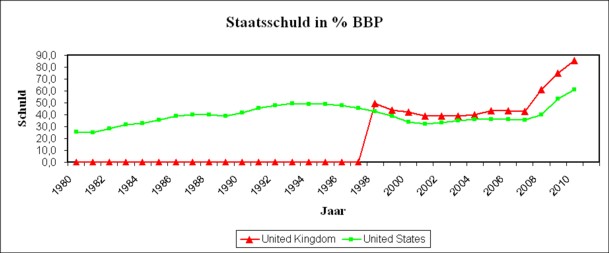
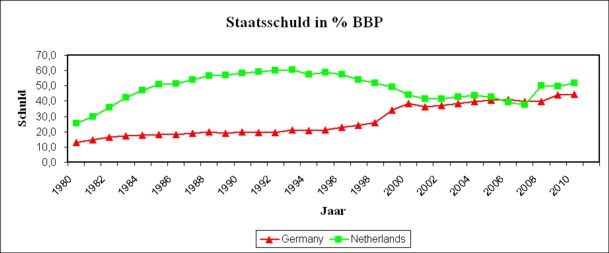
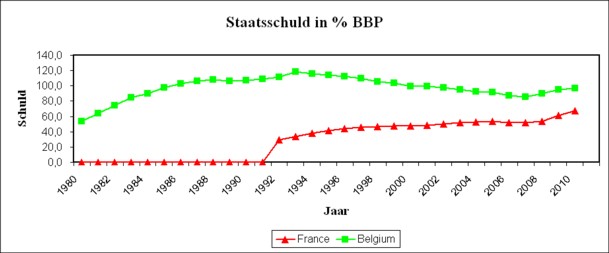
The national debt as a percentage of the GDP is shown in the figures 2a-b-c. It turns out that the national debts are very different, due to institutional differences. For instance, Germany is a federation, so that a part of the debts is shifted to the associated states37. The falling debt in NL and BE is not purely a voluntary political choice, but enforced by the Stability- and growth pact of the European Union. For, this obliges the states to limit their debt to maximally 60% of the GDP. Despite such external influences the development of the national debts is relevant for this column, because the radical centre aims to realize a supply-side policy. The state budget must structurally be balanced. The comparison of the figures 2a-b with the figure 2c does also here not exhibit a clear positive influence of the radical centre.
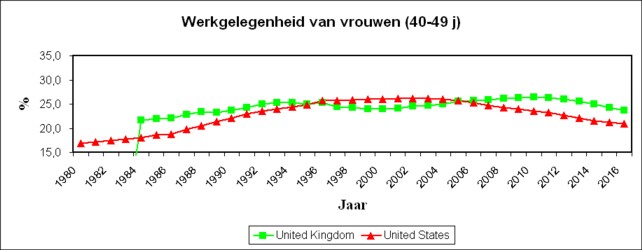
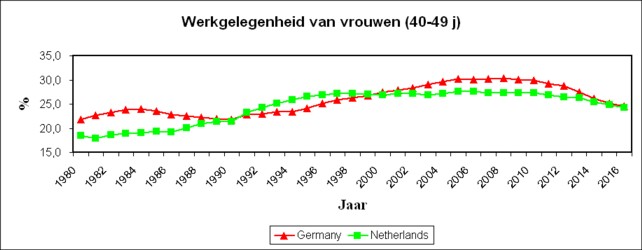
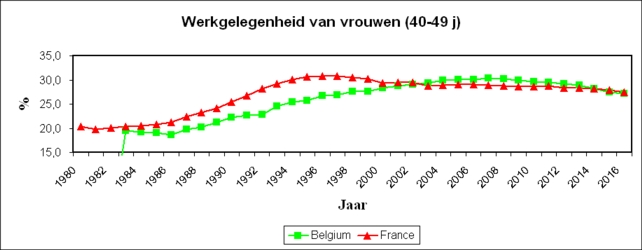
The share of women (with an age between 40 and 49 years) in the total employment is shown in the figures 3a-b-c. The employment is obviously affected by the conjuncture. Besides, the share can change due to aging, although your columnist does not know how. Nevertheless this indicator is also relevant for the radical centre, because this political current wants to further the emancipation of women. It is true that the figures show a strong increase, but it happen mainly in 1985-2000, so already before the rise of the radical centre. The comparison of the figures 3a-b with the figure 3c again shows no systematic improvement due to the radical centre. The picture is arbitrary. It gives the impression, that the development is mainly determined by cultural and institutional factors.
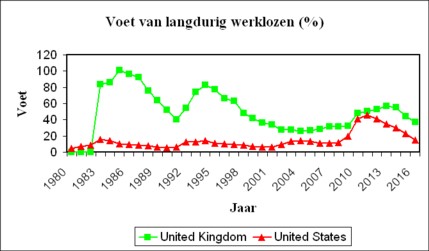
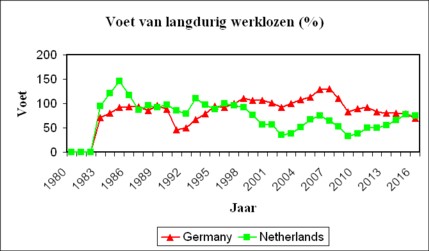
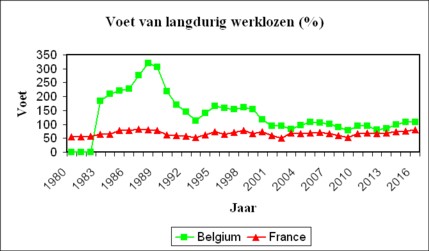
The rate of the number of protractedly unemployed (longer than a year) in comparison with the briefly unemployed (less than a year) is presented in the figure 4a-b-c. The concept of unemployment is complex. States register their unemployment with different methods38. The unemployment is obviously sensitive to the conjuncture. The fluctuations in the time series show, that the number of protractedly and briefly unemployed react differently to the conjuncture. During the hausses of 1988, 1999 and 2006 the briefly unemployed quickly find a new job. On the other hand, the protractedly unemployed have even in the hausse little chance to find a job. Therefore their number remains fairly constant. It does appear, that mainly during the baisse they become discouraged to such an extent, that many of them end their applications, and therefore disappear from the statistics.
Nevertheless, the radical centre gives priority to their participation, which must result in a structural decrease of the number of protractedly unemployed. The figures 4a-b-c indeed exhibit a falling trend, at least until the baisse of 2010. But the trend in the figures 4a-b is not better than in 4c. Here a complication is, that it will take some time, before the reintegration programs show their effects. For, the protractedly unemployed must first re-train, or have new experiences. Thus it is indeed difficult to separate the policy- and conjuncture components. Moreover, the subsequent governments have often ended the policy of the radical centre. This would make the number of protractedly unemployed rise again39.
In conclusion, your columnist has copied time series for a number of states and economic variables from the OECD files, and presented them graphically. These variables must be sensitive to the policy of the radical centre. Nevertheless, they do not exhibit clear and convincing policy effects. Apparently, this simple analysis does not suffice for showing, that the paradigm of the radical centre is sound. The figures are scientifically rather meaningless. The figures are clustered in such a manner, that they also represent the polarity of Meyer in libertarian (category a) and social (category b and c) extremes. As the reader may observe, there are no indications, that the social democracy performs better than the libertarian democracy (the Anglosaxon system). On the other hand, the preceding text shows the richess of the data, that are available for all on the internet. Your columnist hopes to readdress the subject in the future.